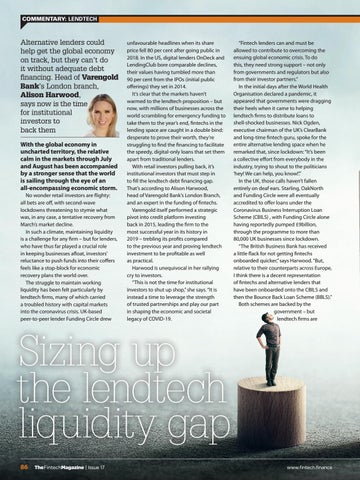COMMENTARY: LENDTECH
Alternative lenders could help get the global economy on track, but they can’t do it without adequate debt financing. Head of Varengold Bank’s London branch, Alison Harwood, says now is the time for institutional investors to back them With the global economy in uncharted territory, the relative calm in the markets through July and August has been accompanied by a stronger sense that the world is sailing through the eye of an all-encompassing economic storm. No wonder retail investors are flighty: all bets are off, with second-wave lockdowns threatening to stymie what was, in any case, a tentative recovery from March’s market decline. In such a climate, maintaining liquidity is a challenge for any firm – but for lenders, who have thus far played a crucial role in keeping businesses afloat, investors’ reluctance to push funds into their coffers feels like a stop-block for economic recovery plans the world over. The struggle to maintain working liquidity has been felt particularly by lendtech firms, many of which carried a troubled history with capital markets into the coronavirus crisis. UK-based peer-to-peer lender Funding Circle drew
unfavourable headlines when its share price fell 80 per cent after going public in 2018. In the US, digital lenders OnDeck and LendingClub bore comparable declines, their values having tumbled more than 90 per cent from the IPOs (initial public offerings) they set in 2014. It’s clear that the markets haven’t warmed to the lendtech proposition – but now, with millions of businesses across the world scrambling for emergency funding to take them to the year’s end, fintechs in the lending space are caught in a double bind: desperate to prove their worth, they’re struggling to find the financing to facilitate the speedy, digital-only loans that set them apart from traditional lenders. With retail investors pulling back, it’s institutional investors that must step in to fill the lendtech debt financing gap. That’s according to Alison Harwood, head of Varengold Bank’s London Branch, and an expert in the funding of fintechs. Varengold itself performed a strategic pivot into credit platform investing back in 2015, leading the firm to the most successful year in its history in 2019 – trebling its profits compared to the previous year and proving lendtech investment to be profitable as well as practical. Harwood is unequivocal in her rallying cry to investors. “This is not the time for institutional investors to shut up shop,” she says. “It is instead a time to leverage the strength of trusted partnerships and play our part in shaping the economic and societal legacy of COVID-19.
“Fintech lenders can and must be allowed to contribute to overcoming the ensuing global economic crisis. To do this, they need strong support – not only from governments and regulators but also from their investor partners.” In the initial days after the World Health Organisation declared a pandemic, it appeared that governments were dragging their heels when it came to helping lendtech firms to distribute loans to shell-shocked businesses. Nick Ogden, executive chairman of the UK’s ClearBank and long-time fintech guru, spoke for the entire alternative lending space when he remarked that, since lockdown: “It’s been a collective effort from everybody in the industry, trying to shout to the politicians ‘hey! We can help, you know!’.” In the UK, those calls haven’t fallen entirely on deaf ears. Starling, OakNorth and Funding Circle were all eventually accredited to offer loans under the Coronavirus Business Interruption Loan Scheme (CBILS) , with Funding Circle alone having reportedly pumped £9billion, through the programme to more than 80,000 UK businesses since lockdown. “The British Business Bank has received a little flack for not getting fintechs onboarded quicker,” says Harwood. “But, relative to their counterparts across Europe, I think there is a decent representation of fintechs and alternative lenders that have been onboarded onto the CBILS and then the Bounce Back Loan Scheme (BBLS).” Both schemes are backed by the government – but lendtech firms are
Sizing up the lendtech liquidity gap 86
TheFintechMagazine | Issue 17
www.fintech.finance
